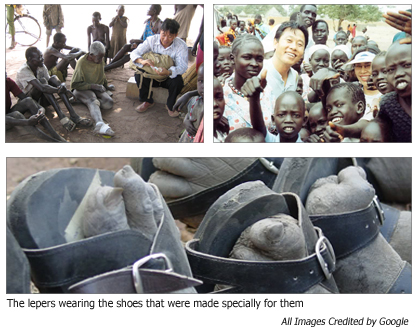He was singing and laughing in the beginning of the movie and looked very bright and cheerful even though he was sick. He was born in Busan in 1962, the ninth of ten children. After completing medical school, he completed his military service as an Army doctor. Instead of choosing a comfortable life in Korea, he threw away the title as a doctor and decided to become a Catholic priest. There were already a priest and a nun among his siblings, so his mother did not want him to join the church, but he was firm in his decision.
When he was a child, Lee Tae-suk saw a movie, The story of Father Damien, in which the main character cared for lepers in Molokai and eventually died of Hansen’s disease. His brother said this movie might have inspired Lee Tae-suk to become a priest for the poor. When he was a seminary student, he went to Tonj in southern Sudan which suffered from mass poverty. The people of Tonj were in disarray because of wounds, both physical and emotional, caused by a continuous civil war. He was shocked to see the serious situation there. He applied to go to Tonj in November 2001 to help the poor after he was ordained a priest. He always remembered what Jesus said “whatever you did for one of these least brothers of mine, you did for me.”and behave like it.
He is often called “John Lee” by the Tonj people because his baptismal name was John. John Lee was a priest, doctor, teacher, and friend to them.
He became a doctor for Tonj citizens who were dying of malaria and cholera. The early medical office was just a hut with little light. He built a small office out of mud later, and eventually started the construction of a new clinic. It was only a 12-room structure, but all of the building materials other than sand were from Nairobi, Kenya, 2,000km away from Tonj. He and the villagers made bricks and built the clinic together. John Lee also installed solar panel roofs to get electrical power so that he could store temperature sensitive vaccines in refrigerators. Regardless of the time of day, he always welcomed and treated patients without sending them away, and also visited those who could not come to his medical office. He treated lepers, gave them custom-made shoes, and listened carefully. John Lee was a doctor and a friend that treated not only disease but also broken hearts.

Mr. Lee considered education as the only way to save the people in hopeless Tonj, so he repaired a war-ravaged building and turned it into a high school. The children wanted to study, so he kept the lights on until 11 p.m. even though there was a constant electricity shortage. He also tutored them in mathematics at the school because of the lack of teachers.
John Lee had had natural talent for music since childhood. For example, he learned to play the organ by himself because his family could not afford to let him take piano lessons. He was able to play at children’s masses some months later. He wrote and composed a song called ‘Meditation,’ when he was 16. He believed that music, just as it did to him in the past, could provide joy and hope to those children’s hearts suffered from the war, so he taught music. In order to teach the children, he first mastered how to play brass instruments by merely reading instructions. Four days after the first ensemble practice, the children performed an ensemble piece. It was hard to imagine this happening in Sudan because of the constant state of civil war. The children said that they wanted to melt guns and knives into clarinets and trumpets.
He had some routine checkups when he came to Korea for vacation in November 2008. The results were devastating because he was in the final stage of a colorectal cancer. Despite this, he was more concerned about his responsibilities in Tonj than his health. “I have to finish digging wells, I should go back to Tonj” he said, but the doctor and his friends stopped him. Although he was sick, he always kept a bright face. He wrote a book titled ‘Will you be my friend?’ and played at concerts to raise money for Tonj. Until the last minute, he missed the children of Tonj and finally died on Jan. 14, 2010 without ever going back to.
He lived during the same time period as I, but his life was quite different from mine. His life was about ‘love’ and ‘sharing.’ He was delighted to share with others, but I feel ashamed reminding myself of how I usually look away from people who are in trouble. I became grateful for what I have and for simple things like clean water to drink, a cozy house to sleep in, the fact that I can study and so on. His sincere and endless love brought about change in the Tonj peoples mind. I feel that a person’s sincerity can bring changes and human beings are very precious and beautiful. He told and calmly showed me how to live my life properly and I realized what kind of life that I should pursue. I strongly recommend for you to listen to his voice and sink into his life like I did.
All Images Credited by Google
Hwang Yoon-jeong Reporter
mimitoto99@uos.ac.kr

